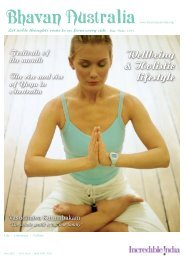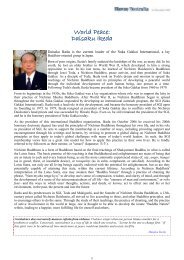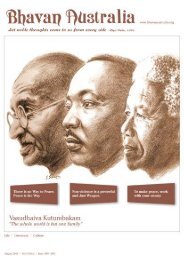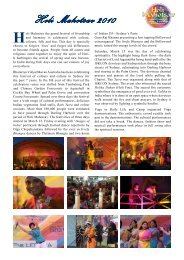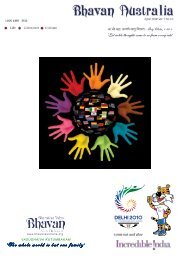The whole world is but one family - Bharatiya Vidya Bhavan Australia
The whole world is but one family - Bharatiya Vidya Bhavan Australia
The whole world is but one family - Bharatiya Vidya Bhavan Australia
Create successful ePaper yourself
Turn your PDF publications into a flip-book with our unique Google optimized e-Paper software.
of secular values for a harmonious coex<strong>is</strong>tence;<br />
• To create pressure groups to condemn acts of<br />
violence and exclusion and to propagate actions<br />
and initiatives to promote peace and inclusion;<br />
• To reaffirm secular values and multicultural<strong>is</strong>m<br />
for maintaining and strengthening democratic<br />
values based on respect for human rights; and<br />
• To encourage, facilitate and establ<strong>is</strong>h similar<br />
coalition of citizens to promote secular values,<br />
religious tolerance, democracy and human rights<br />
and accelerate women’s participation in secular<br />
movements striving for equality and justice.<br />
Gandhian women such as Nirmala Deshpande<br />
and Medha Patkar have galvan<strong>is</strong>ed hundreds of<br />
women into peace movement and have brought to<br />
the fore women’s agency in peace keeping.<br />
<strong>The</strong> international women’s rights movement<br />
has decided:<br />
• To organ<strong>is</strong>e and mobil<strong>is</strong>e men, women and<br />
children to reiterate and reinforce the importance<br />
of secular values for a harmonious coex<strong>is</strong>tence;<br />
• To create pressure groups to condemn acts of<br />
violence and exclusion and to propagate actions<br />
and initiatives to promote peace and inclusion;<br />
• To reaffirm secular values and multicultural<strong>is</strong>m<br />
for maintaining and strengthening democratic<br />
values based on respect for human rights;<br />
• To encourage, facilitate and establ<strong>is</strong>h similar<br />
networks of citizens to promote secular values,<br />
religious tolerance, democracy and human rights<br />
and accelerate women’s participation in secular<br />
movements striving for equality and justice;<br />
• To counter violence on women, dalits, minorities,<br />
tribals and to contri<strong>but</strong>e to the efforts for gender<br />
justice, social justice and d<strong>is</strong>tri<strong>but</strong>ive justice; and<br />
• To cons<strong>is</strong>tently ra<strong>is</strong>e our voices against<br />
fundamental<strong>is</strong>m and communal<strong>is</strong>m and to initiate<br />
action against all forms of d<strong>is</strong>crimination.<br />
Like Gandhiji’s v<strong>is</strong>ion, women’s v<strong>is</strong>ion of a<br />
harmonious society revolves around concerns such<br />
as social justice, gender justice and d<strong>is</strong>tri<strong>but</strong>ive<br />
justice. Prospects and possibilities for establ<strong>is</strong>hing<br />
harmony at the grassroots have increased due to<br />
multi-pronged efforts at community level, national<br />
and global efforts.<br />
Harmony for women’s rights movement <strong>is</strong>:<br />
• Justice, equality and peace in the <strong>family</strong><br />
and the <strong>world</strong>;<br />
• Harmony at the grassroots <strong>is</strong> best promoted<br />
by those whose stakes are high: the rural<br />
poor women from Tribal, Dalit and Minority<br />
communities—d<strong>is</strong>criminated thrice over by<br />
12 | <strong>Bhavan</strong> <strong>Australia</strong> | February 2012<br />
caste, class and gender; and<br />
• Putting women’s concerns in center will ensure<br />
development <strong>is</strong> equitable and sustainable. Women<br />
are adept at bridging ethnic, religious, political,<br />
and cultural divides. Under mature leadership they<br />
are collaborative, inclined towards consensus and<br />
comprom<strong>is</strong>e. Experiences of varied memberships<br />
in mahila mandals at the village level from different<br />
castes, religions, classes come together for<br />
common goals.<br />
“For generations, women have served as peace<br />
educators, both in their families and in their<br />
societies. <strong>The</strong>y have proved instrumental in<br />
building bridges rather than walls.”<br />
- UN Secretary-General Kofi Annan.<br />
Women have their fingers on the pulse of the<br />
community. <strong>The</strong>y are close to the roots of the<br />
conflict, have accurate information about the<br />
conflict as information givers/evidence and play<br />
a critical role in mobil<strong>is</strong>ing their communities to<br />
begin the process of reconciliation and rebuilding<br />
once hostilities end. Women are community<br />
leaders. Women are often at the centre of nongovernmental<br />
organ<strong>is</strong>ations, popular protests,<br />
electoral referendums, and other citizenempowering<br />
movements whose influence has<br />
grown with the global spread of democracy.<br />
Women are highly invested in preventing, stopping,<br />
and recovering from conflict, are motivated to<br />
protect their children and ensure security for<br />
their families. Despite being victims of violence,<br />
the consequences of absence of peace are most<br />
felt by them. Hence, in all conflict situations,<br />
women continue to pursue peace processes as it <strong>is</strong><br />
expressed in the following pledge taken by women<br />
after the Gujarat Riots (2002).<br />
“We, <strong>The</strong> Women of India, have solemnly resolved<br />
to unite our collective w<strong>is</strong>dom for the betterment<br />
of our community and ourselves. We hereby vow to<br />
strive towards bringing PEACE and Togetherness in<br />
our families and neighbourhood and work towards<br />
communal harmony. To educate ourselves,<br />
our men and our children about the values of<br />
compassion, love, integrity, h<strong>one</strong>sty, truthfulness,<br />
hard work, acceptance, forgiveness, sharing,<br />
respect for humanity and our environment. To<br />
ra<strong>is</strong>e collective voice against those indulging<br />
in suppression, oppression, exploitation,<br />
victim<strong>is</strong>ation and abuse of ourselves, our men and<br />
our children. To strive towards social, economic<br />
and political justice, liberty of thought, expression,<br />
belief, faith, worship and equality of status and<br />
of opportunity for ourselves, our men and our<br />
children.”<br />
Vibhuti Patel, Professor and Head, Post Graduate<br />
Department of Economics SNDT Women’s<br />
University.<br />
Source: <strong>Bhavan</strong>’s Journal,<br />
September 15 & 30, 2011



